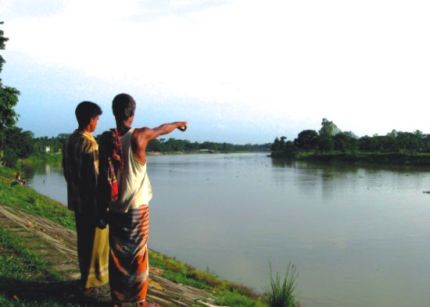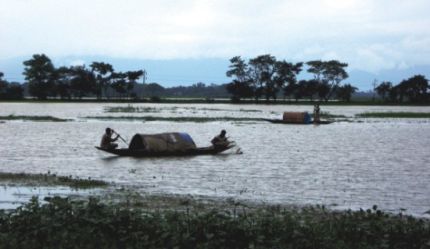TODAY -
Muddying the Waters
- Part 1 -
By Syed Zain Al-Mahmood *
India's plan to build a mega dam on the Barak river at Tipaimukh has stirred primal fears in Bangladesh. For the 150 million people of this low-lying delta, the rivers are the cradle of life. Bangladeshis depend on the river system for food, water and transportation. After the disaster caused by India's Farakka Barrage, Bangladesh can ill afford another monstrosity that will squeeze the rivers' life-giving flow. Public concern has been heightened by the extraordinary secrecy that has shrouded Tipaimukh from the beginning. Although Indian diplomats have been at pains to assure Bangladesh that Tipaimukh will not have the same ecological effects as Farakka, people remain fearful. Many critics have suggested the Tipaimukh Multipurpose Dam project could cause desertification of the North-east and allow salinity to move up from the Bay of Bengal. But the freewheeling debate about desertification may be masking more critical social and environmental consequences.
|
Sitara Begum is a daughter of the Surma. She was born beside the river, swam in it as a teenager and when she got married, her bridal party rented 12 boats to make the ceremonial trip to her tiny fishing village perched on the riverbank. Now, a mother of three, Sitara looks to the Surma for her livelihood. Her husband Kalam is a fisherman.
Sitara's life is usually as placid as the waters that flow swiftly and silently past her village. But recently all has not been well in her world. There is talk of a big dam being built upriver in India. Sitara's husband and father-in-law discuss it every night over dinner. Sitara does not understand all that is going on, but she knows any changes in the river's life-giving flow would be disastrous.
"The river is our mother," she says. "We catch our fish from it, bathe our children in it and take our vegetables and fish to market along it. If the river were to dry up, what would happen to us?"
Sitara Begum is one of nearly 20 million people who inhabit the floodplains of the Surma-Kushiara-Kalni basin. Most are connected to fishing and agriculture, and are entirely dependent on the bounty of the river system. The low-lying marshy areas are locally known as Haors. Enriched by the fertile silt deposited through the natural ebb and flow of the rivers, the haors serve as the rice bowl of the Northeast.
Given that rivers are such an important economic and cultural resource for Bangladesh, it is easy to understand why India's Tipaimukh Multipurpose Dam Project has caused an outpouring of public concern. India is building the Tipaimukh dam near the confluence of the Barak and Tuivai rivers in the southwestern corner of Manipur state, roughly 200 km from the Bangladesh border. The Barak enters Bangladesh at a place called Amalsidh, near Zakigonj in Sylhet, after splitting into the Surma and Kushiara rivers. The Surma and Kushiara in turn unite near Bhairab to form the mighty Meghna. The Surma-Kushiara-Meghna system -- supporting the livelihood of roughly 50 million people spanning 16 districts -- is one of the three main river systems in Bangladesh.
The Tipaimukh dam itself will be a rocky behemoth 500 ft high and 1200 ft across --the equivalent of a wall across the river as tall as a 50-storey building. Indian experts say the dam was originally designed to contain floodwaters in the lower Barak valley but hydropower generation was later incorporated into the project.
"The authorities claim it will generate 1500 MW of electricity," says Dr. R.K. Ranjan Singh, prominent writer and Registrar of Manipur University, speaking to the Star during a seminar in Sylhet recently. "But a careful study of the specifics shows a firm capacity of only 412 MW."
From the time it was first mooted in the early 70s, the Tipaimukh dam project has been shrouded in extraordinary secrecy. There was suspicion that the large dam was being planned without much attention to environmental and economic concerns. Data was hard to come by, and when the mandatory public hearings were held in Manipur, locals say they took place behind closed doors with the army guarding the perimeter.
Some of the loudest voices of protest have come from within India itself. India's own Arundhati Roy wrote, " Big Dams haven't really lived up to their role as the emblems of Man's ascendancy over Nature. It's common knowledge now that Big Dams do the opposite of what their Publicity People say they do - the Local Pain for National Gain myth has been blown wide open."
|
Rights groups in Manipur, Assam and Mizoram have been opposing the dam for decades, holding up its progress. In a memorandum to the Prime Minister Dr. Manmohan Singh, the Action Committee Against Tipaimukh Project wrote in 2007: "The mega-dam proposed at Tipaimukh will smother this river; change its age-old knowable and reliable nature; and drown us all in sorrow forever! This project is not 'for the people."
In Bangladesh, the country with potentially the most to lose from the dam, the opposition had been muted until recently. Although several environmental groups had raised the issue, and successive governments had asked their Indian counterparts to provide data on the project, nothing much was known. Meanwhile, the Indian government quietly floated international tender and completed preparations for construction. It was only when Shiv Shankar Menon, the Indian Foreign Secretary, arrived in Dhaka in April and requested the government to send a delegation to visit the site did environmental groups, political parties, and the people of the Northeast erupt in protest.
Since then, protesters at the almost daily rallies have criticised India's unilateral actions on a shared river. "We are a sovereign nation. We want to live in peace with our neighbours in an atmosphere of mutual respect. We ask that India desist from this act, which we do not consider neighbourly. Along with the people of Manipur, we will raise our voice against the Tipaimukh dam," said Engineer Hilaluddin, Director of Angikar Bangladesh, an environmental group that campaigns against obstruction of river waters. "I call on India to let the Barak run free."
Bangladesh already has a complex and increasingly difficult relationship with water. River erosion, rising sea levels, increased salinity and arsenic in ground water pose formidable problems. Rivers in the North and Southwest have dried up, and saline water has advanced from the Bay of Bengal. Critics blame the Farakka barrage that India put into operation in 1975 for drying up large parts of the country, affecting navigation and adversely influencing the environment, agriculture and fisheries. Water resources experts also say India's dam on the Teesta river has affected the performance of Bangladesh's own irrigation barrage, seriously hurting millions of farmers in the country's north.
Faced with such intractable problems, Bangladesh can ill afford another monstrosity that will squeeze the rivers' life-giving flow. "What is power-luxury for India is a life-and-death question for Bangladesh," said Prof Muzaffer Ahmad, president of Bangladesh Paribesh Andolon (Bapa), an environmental forum. "Energy cannot be more important than human disaster."
Speaking to reporters at a round table on climate change, Muzaffer, a prominent academic and former chairman of Transparency International Bangladesh, said: "The rivers of Bangladesh will dry up during winter and overflow during the monsoon with the construction of Tipaimukh dam."
He condemned recent statements by a couple of ministers that the damage could not be assessed before the dam is built. "Refrain from utterances that may harm interests of the country and the people," said Prof Ahmad.
At a conference on the Tipaimukh dam on June 19, organised by Angikar Bangladesh and attended by Finance Minster AMA Muhith as chief guest, speakers called for national unity against the construction of the Tipaimukh dam forgetting political and regional differences. Dr Abdul Matin, General Secretary, Bapa, drew the attention of the conference to a mistake committed by Bangladesh in 1974 by agreeing to the Indian suggestion of a "trial run" of the Farakka barrage. That trial run never stopped.
The passionate opposition to the Tipaimukh dam has so far focused on the possibility of desertification and increased salinity. It is easy to draw comparisons with Farakka. But the freewheeling debate about desertification may be hurting, not helping, Bangladesh's cause.
Indian diplomats have been quick to point out the differences between Farakka and Tipaimukh. "The so-called experts in Bangladesh are using scare tactics," said the Indian High Commissioner to Bangladesh Pinak Ranjan Chakravarty in an aggressive tone that surprised many in the diplomatic circles. "This is a hydroelectric dam. In order to generate power, it must release water. So, Bangladesh will probably get more water in the dry season."
The High Commissioner's not-so-diplomatic pronouncements irked many people, but leading water experts seem to agree with him -- for at least part of the way.
"We have to understand the difference between a dam and a barrage," says Professor Jahir Uddin Chowdhury of the Institute of Water and Flood Management at the Bangladesh University of Engineering and Technology (Buet). "A dam is a large wall or barrier that obstructs or stops the flow of water, forming a reservoir or a lake. Electricity is produced by using the potential energy of the dammed water to drive turbines. A barrage is a specialised dam with sluice gates often used for irrigation and flood control."
Prof Jahir says the Indian Multipurpose Project envisaged a barrage 100 km downstream from the dam at a place called Phulertal. "If India builds the Phulertal barrage then a Farakka-like scenario may become reality. If, on the other hand, they just build the Tipaimukh hydel dam, water will probably increase during the winter what we call augmentation. In this scenario, we have to carefully assess the downstream environmental impact."
Water resources expert Dr Ainun Nishat believes more data on the design and operations of the Project are needed to decide whether the flow will increase or decrease during wet and dry seasons, but he suggests in either case the effect on the Surma basin will be destructive.
To be continued....
* This article is published by Syed Zain Al-Mahmood for The Star Magazine which is based in Dhaka, bangladesh. The writer can be contacted at thestarmagazine(at)gmail(dot)com
You can read the entire article at The Star Magazine . This article was webcasted on August 11th, 2009.
* Comments posted by users in this discussion thread and other parts of this site are opinions of the individuals posting them (whose user ID is displayed alongside) and not the views of e-pao.net. We strongly recommend that users exercise responsibility, sensitivity and caution over language while writing your opinions which will be seen and read by other users. Please read a complete Guideline on using comments on this website.
LATEST IN E-PAO.NET
Jump Start
DBS Imphal SubSite |
Readers Mail |
Editorials |
Education Announcements |
Essay |
Exclusive Event |
Flash - Audio Visual |
Incidents |
LFS Imphal SubSite |
News Timeline |
Poetry |
Opinion |
Sports |
Rock Concert |
RSS |
Top Stories |
Wathi Jugai









